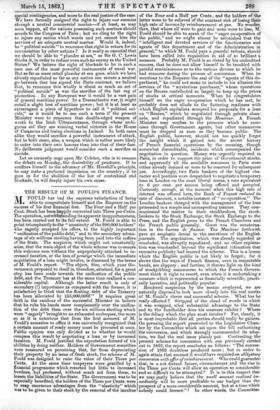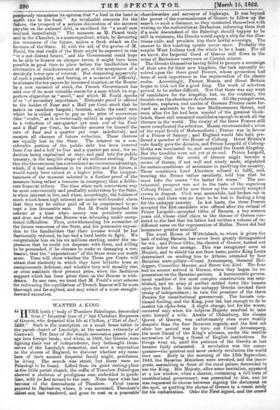THE RESULT OF M. FOULD'S FINANCE.
it FOULD has had the supreme satisfaction of being _MA able to congratulate himself and the Emperor on the success of his first financial feat. The Four and a Half per Cent. Stock has been happily converted into Three per Cents. The operation, notwithistanding its apparent inopportuneness, has been carried out to its full extent. M. Fould is able to point triumphantly to the "unanimity of the 380,000 holders" who eagerly accepted his offers, to the highly important "unification of the public debt," and to the secondary advan- tage of six millions sterling having been paid into the coffers of the State. The suspicion which might not unnaturally arise, that the main object of the whole scheme was to secure this welcome sum without the unpopularity attached to in- creased taxation, or the loss of prestige which the immediate negotiation of a loan might involve, is disarmed by the terms of M. Fould's report. "The object, Sire, which your Go- vernment proposed to itself is, therefore, attained, for a great step has been made towards the unification of the public debt, and the Treasury has at the same time realized a con- siderable capital. Although the latter result is only of secondary (!) importance as compared with the former, it is satisfactory to think that the floating debt of the Treasury has been alleviated by 155,000,000f." It requires great faith in the candour of the successful Minister to believe that he rubs his hands more complacently over the unifica- tion of the debt than over the six millions sterling which were "eagerly" brought to an exhausted exchequer, the more so as it is notorious that from the first moment of M. Fould's accession to office it was universally recognized that a certain amount of ready money must be procured at once. Public opinion was only divided as to whether he would compass this result by negotiating a loan or by increased taxation. M. Fould justified the expectation formed of his abilities by doing neither. Holders of Government securities were reassured on perceiving that, far from depreciating their property by an issue of fresh stock, the scheme of M. Fould was designed to raise the value of their Three per Cents. At the same time taxpayers were gratified by a financial programme which resorted but little to increased burdens, but professed, without much aid from them, to lessen the liabilities of the State. The Government was to be especially benefited, the holders of the Three per Cents. were to reap enormous advantages from the "elasticity" which was to be given to their stock by the removal of the incubus of the Four and a Half per Cents., and the holders of the latter were to be relieved of the constant risk of losing their high rate of income by reimbursement at par. No wonder, then, that where all were to gain and none were to lose, M. Fould should be able to speak of the "eager co-operation of the public," and we might almost be astonished that the "intelligent and devoted services of the functionaries and agents of this department and of the Administration in general," to which M. Fould pays a graceful tribute, should have been called into requisition in aid of so brilliant a measure. Probably M, Fould is so elated by his undoubted success, that he does not allow himself to be troubled with painful reminiscences as to the various devices to which he had recourse during the process of conversion. When he mentions to the Emperor the zeal of the "agents of this de- partment," he could not mean to include in his allusion the services of the "mysterious purchaser," whose operations on the Bourse contributed so largely to keep up the prices of stocks at critical moments. When he congratulates himself on the eager co-operation which he has met, he probably does not allude to the flattering readiness with which English capitalists accepted his proposals for a loan on " Rentes," which he negotiated through private chan- nels, and repudiated through the Monitewr. A French Minister may confess to the pressure which he exer- cises through Government agents, but other manceuvres must be dropped as soon as they become public. The English public, however, should not too quickly forget the insight which it gained into the secret history of French financial operations by the amusing, though somewhat discreditable, incidents which accompanied the negotiation in question. Money was urgently required in Paris, in order to support the price of Government stocks, and apparently all the available resources in Paris were either already drained or were to be reserved for subsequent pee. Accordingly, two Paris bankers of the highest cha- racter and position were despatched to negotiate a temporary loan in London on the most liberal terms, a rate equivalent to 6 per cent. per annum being offered and accepted. Curiously enough, at the moment when this high rate of interest was offered here, the Bank of France reduced its rate of discount, a notable instance of "co-operation." The London bankers charged with the management of the loan proceeded in a simple and unsuspecting manner. They com- municated the matter to their stockbrokers, the stock- brokers to the Stock Exchange, the Stock Exchange to the Press, and the English press to the French Chambers and the French public generally. Great was the consterna- tion in the bureau de finance. The Moniteur forthwith gave an emphatic denial to the assertions of the English journals. The negotiation, which was already regarded as concluded, was abruptly repudiated, and no other explana- tion was vouchsafed beyond the significant intimation that excessive publicity had marred the scheme. This is a lesson which the English public is not likely to forget ; for it shows that the ways of French finance, even in respectable hands, are slippery ; and further, it throws light on the kind of stockjobbing manceuvres to which the French Govern- ment thmk it right to resort, even when it is undertaking a measure which is represented as financially scientific, practi- cally lucrative, and politically popular. Rendered suspicious by the means employed, we are naturally disposed to look more closely into the real merits of M. Fould's clever and successful scheme. What has he really effected ? Stripped of the cloud of words in which it was wrapped, what substantial advantage to the State and to the fuudholder does his measure exhibit ? Where is the fallacy which the plan must involve ? For, clearly, it is most improbable that all parties should really be gainers. On perusing the report presented to the Legislative Cham- ber by the Committee which sat upon the bill authorizing the conversion, and which strongly recommended its adop- tion, we find the real issue plainly put. Contrasting the present scheme for conversion with one previously carried out in 1852, the report concludes as follows; "The conver- sion of 1852 doubtless produced more ; but in order to again attain that amount it would have required an obligatory conversion with (Pr of reimbwrsement. Who could guarantee that, in a not distant future, circumstances and the rise in the Three per Cents. will allow an operation so considerable and so difficult to be attempted? It is in this respect that we may justly believe that the small amount realized im- mediately will be more profitable to our budget than the prospect of a more considerable amount, but at a time which nobody could foresee." ! In other words, the Committee pompously enunciates its opinion that "a bird in the hand is worth two in the bush." An invaluable resource for the future, the prospect of a serious diminution of the interest payalde an the national debt, is sacrificed for "a small sum realized immediately." The measure, as M. Picard truly said in the Chamber, is a mere expedient, which, by devouring the resources of the future, makes a fresh attack on the finances of the State. If, with the aid of the genius of M. Fould, the real credit of the State might be expected to rise "in a not distant future," and the Government could hope to be able to borrow on cheaper terms, it might have been possible in good time to place before the fundholders the alternative of reimbursement at par, or the acceptance of a decidedly lower rate of interest. But despairing apparently of such a possibility, and fearing, at a moment of difficulty, to alienate the tax-payers by increased taxatioe,er the Bourse by a new emission of stack, the French Government has sold one of its most valuable assets for a sum which its sup- porters stigmatize as "small," and which M. Fould speaks of as "of secondary importance," Elaborate proof is offered to the holder of Four and a Half per Cent. stock that he makes an excellent bargain ; because, while the small sum which he is called upon to pay as the price of conversion (the " soulte," as it is technically called) is equivalent only to a reduction of one-quarter per cent. .out of hie Four and a Half per Cent., he thereby secures for himself the rate of four and a quarter per cent. indefinitely, and escapes all chances of future reduction. These chances are equally lost to the State. The interest on a con- siderable portion of the public debt has been lowered from four and a half to four and a quarter per cent., the re- duction being capitalized at once, and paid into the public treasury, in the tangible shape of six millions sterling. For this the Government has surrendered an enormous advantage, which, if it had confidence in its stability and ita future, it would surely have valued at a higher price. The inoppor- tuneness of the moment selected is a further proof of the measure being rather a resource in emergency than a delibe- rate financial reform. The time when such conversions may be most conveniently and profitably undertaken by the State, is when interest is low, and when, accordingly, the holders of stock which bears high interest are under well-founded alarm that they may be either paid off or be constrained to ac- cept a less favourable rate. But M. Fould launched his scheme at a time when money was peculiarly scarce and dear, and when the Bourse was labouring under excep- tional difficulties. Thus, notwithstanding his surrender of the future resources of the State, and his persuasive exposi- tion to the landholders that their income would be but fractionally reduced, he has had a hard battle to fight. We congratulate him on his six millions sterling, under the im- pression that he could not dispense with them, and willing to he persuaded, if he chooses to make so damaging a con- feesion, that the "expectations" of the State were not worth more. Time will show whether the Three per Cents. will attain that elasticity in which they have hitherto been so conspicuously deficient, and whether they will steadily rise, or even maintain their present price, when the factitious support which has been given them on the Bourse is with- down. In any case, we trust that M. Fould's next scheme for redressing the equilibrium of French finance will be more thorough and far-sighted, and may admit of a more straight- forward execution.































 Previous page
Previous page